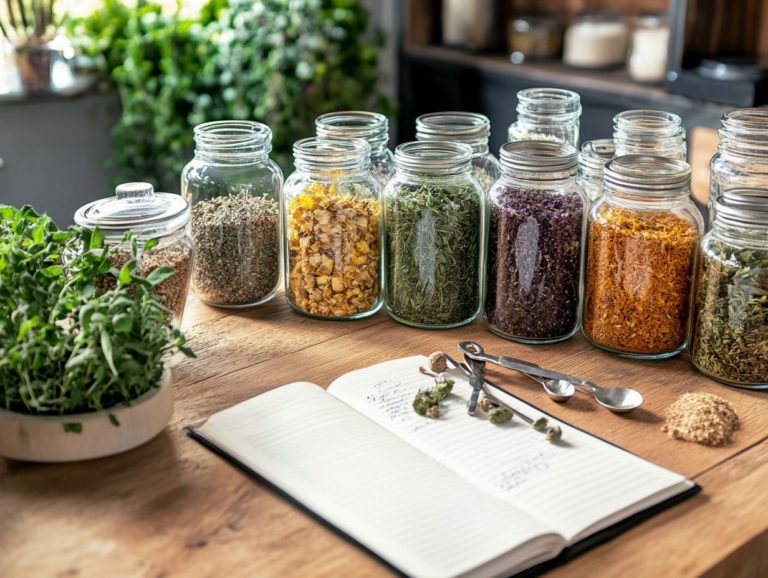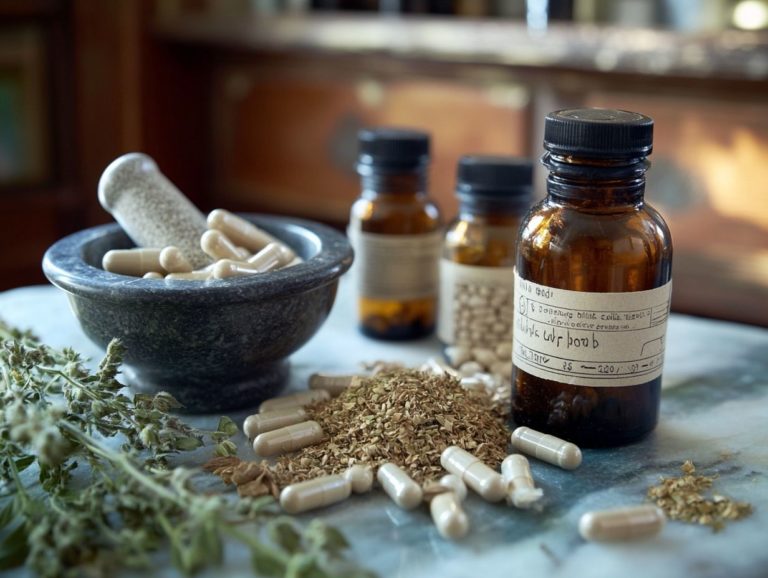Herbal Medicine: Dosage and Interaction Awareness
Join us on a journey to explore the exciting world of herbal medicine! Herbal medicine has become a popular natural option for various health concerns. Understanding its complexities is crucial for safe and effective use; it includes both traditional practices and modern methods.
This article dives into the foundational aspects of herbal medicine, highlighting its diverse applications and the vital importance of proper dosage. You’ll learn about the factors that influence dosage and how to determine the right amounts for different individuals, including considerations for herbal and dietary supplements.
It s essential to stay alert about potential interactions with other medications. Common herbal supplements can sometimes interact with drugs, leading to harmful effects. You ll also find practical tips to ensure your herbal practices enhance your well-being instead of jeopardizing it.
Embark on this enlightening journey to navigate the world of herbal medicine, including the use of botanical products, with confidence and safety by avoiding common herbal dosage mistakes.
Contents
- Key Takeaways:
- Understanding Herbal Medicine
- Importance of Proper Dosage
- Potential Interactions with Other Medications
- How to Stay Safe when Using Herbal Medicine
- Frequently Asked Questions
- What is herbal medicine?
- What is the appropriate dosage for herbal medicine?
- Can herbal medicine interact with other medications?
- What are the possible interactions between herbal medicine and prescription drugs?
- Are there any precautions to take when using herbal medicine?
- Can herbal medicine be used alongside conventional medicine?
Key Takeaways:
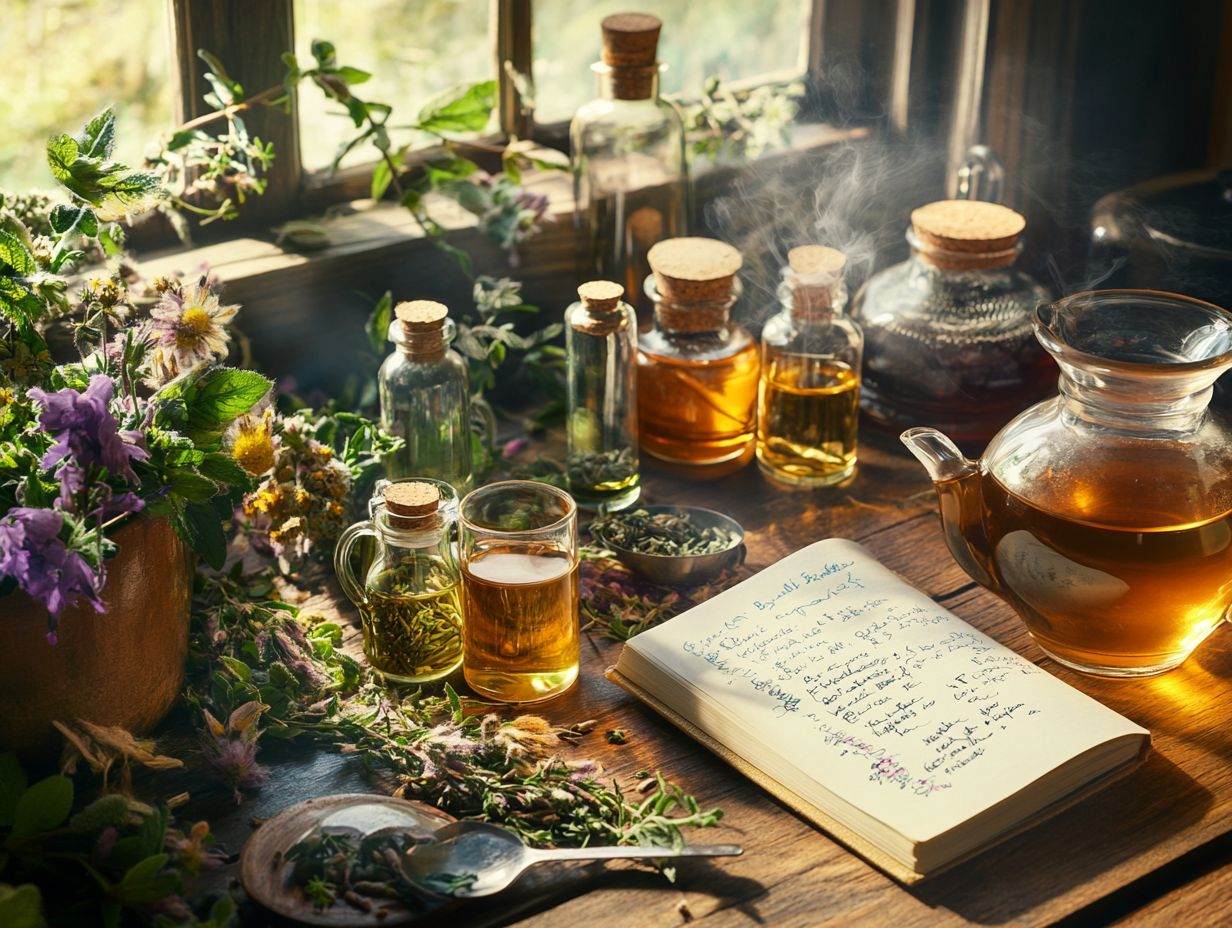
- Get the right dose for safe and effective herbal medicine use!
- Be aware that herbal products, like St. John’s wort and ginkgo, can interact with medications. Always consult a healthcare professional before mixing herbs with your prescriptions.
- Prioritize safety while seeking health benefits from herbal medicine, and keep a list of all medications and supplements you re taking.
Understanding Herbal Medicine
Herbal medicine offers a complete way of healing that utilizes plant-based products and time-honored remedies. It uses parts of plants that help improve health and well-being. This ancient practice has deep roots in many cultures, showcasing the value of natural healing through herbal supplements.
Nowadays, herbal medicine is gaining traction as an alternative or complementary method to modern medicine. Many individuals seek guidance from healthcare professionals to understand the benefits and potential risks associated with herbal products.
Overview of Herbal Medicine and Its Uses
Herbal medicine provides various practices that harness common herbal and dietary supplements to support your immune system and enhance overall health.
Natural remedies, such as echinacea, garlic, and St. John’s wort, can significantly contribute to your wellness journey. Echinacea is famous for boosting immune function, especially during cold and flu season. Garlic is known for its cardiovascular benefits, helping reduce cholesterol levels and promoting heart health. Meanwhile, St. John’s wort is often used to alleviate symptoms of mild to moderate depression and anxiety.
Incorporating these herbal supplements into your daily routine may lead to improved health and a deeper sense of well-being.
Importance of Proper Dosage
Understanding the significance of proper dosage in herbal supplements is essential for maximizing their benefits. Doing so helps minimize potential side effects and ensures your safety throughout the process.
Ready to explore herbal medicine? Talk to your healthcare provider to find the best options for you!
Factors Affecting Dosage
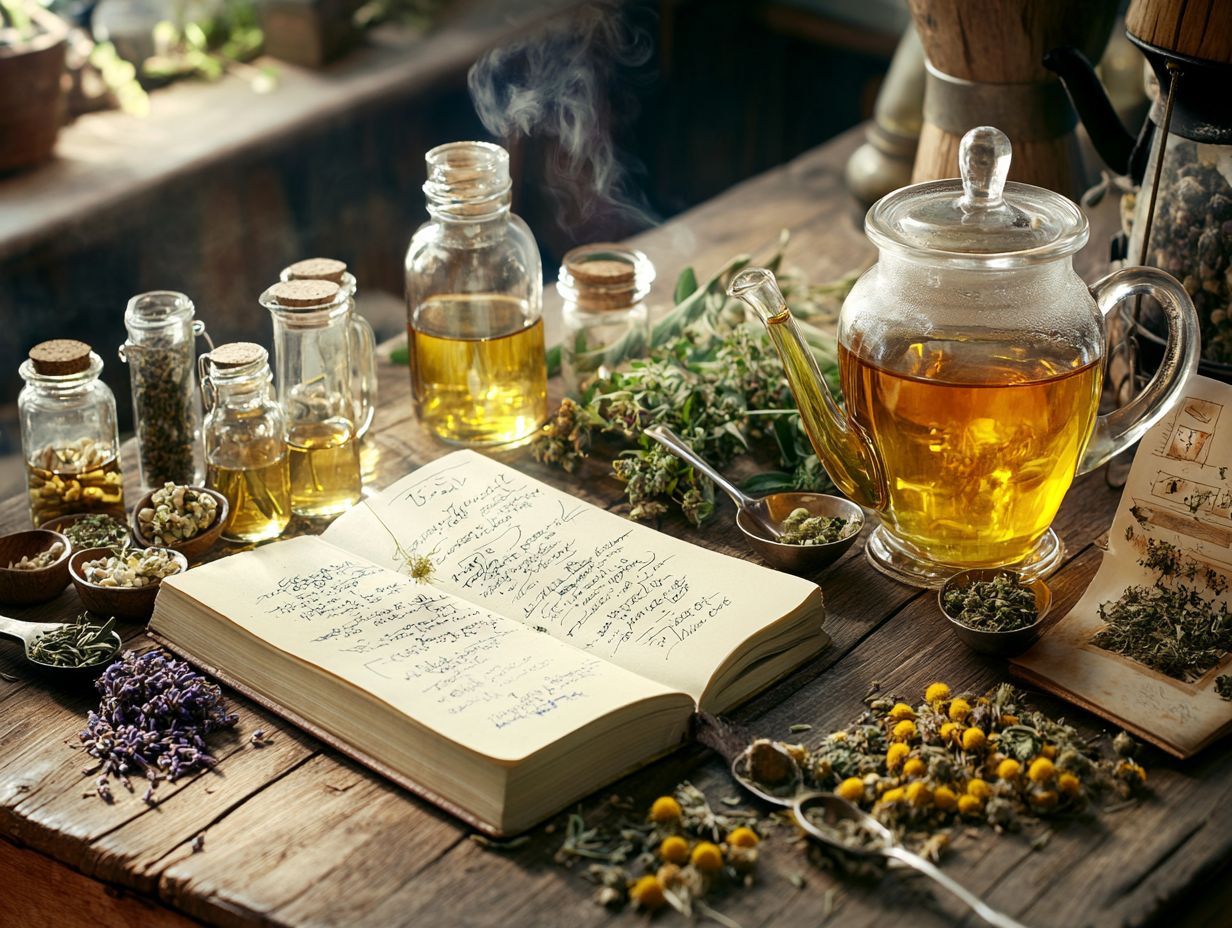
Several factors influence the proper dosage of herbal products for you, including your health status, age, weight, and the concentration of active ingredients. These elements are essential for ensuring both efficacy and safety when considering herbal supplements.
An older adult with chronic health conditions may need a lower dosage. This is due to differences in metabolic rates and potential interactions with other medications.
Healthcare providers can help you navigate this by conducting thorough assessments that consider your unique circumstances. They might suggest starting with a lower dose, monitoring the effects, and then making adjustments as needed, ensuring you receive the most appropriate dosage recommendations for popular herbs tailored to your specific needs.
How to Determine the Right Dosage
Finding the right dosage of herbal supplements is crucial. Consult a healthcare provider and refer to reputable guidelines from manufacturers, as well as insights from clinical trials.
Reviewing reputable sources ensures safety and efficacy. Take the time to check places like the National Center for Complementary and Integrative Health, where you’ll find a treasure trove of evidence-based information and research findings. Additionally, understanding how to measure herbal dosages accurately can enhance your understanding of specific herbs and their recommended dosages.
It’s crucial to consider your personal health condition and any potential interactions, including common herbal supplements like garlic that may affect cardiovascular conditions and blood thinners. Remember, what works wonders for one person might not be suitable for another, making a tailored approach essential for your unique needs. For further insights, explore the importance of safety in herbal medicine.
Potential Interactions with Other Medications
The potential interactions between herbal supplements and prescription medications present significant risks. Understanding these interactions is crucial to avoid serious health risks and prevent any adverse effects.
Being informed about how these substances may interact gives you the power to make safer choices and prioritize your well-being.
Common Interactions and Risks
Several popular herbal supplements, including St. John s wort and ginkgo, can interact with various medications, potentially posing risks to you.
Take St. John’s wort, for example; it can significantly reduce the effectiveness of certain antidepressants, which may lead to withdrawal symptoms or even a resurgence of depression for some individuals. Similarly, ginkgo has been shown to affect blood thinners, increasing the risk of bleeding.
Clinical studies have revealed that patients using these herbal remedies alongside prescribed medications have encountered adverse effects, underscoring the vital importance of awareness and caution. For those interested in making their own remedies, it’s crucial to consider safety tips for creating herbal remedies.
In one particular study, patients taking ginkgo experienced a doubled incidence of bleeding complications when combined with anticoagulant therapy. This highlights why it’s essential for you to consult with your healthcare provider! It’s your best line of defense before mixing herbal supplements with your medications. Understanding the role of body weight in herbal dosage can also be crucial for safe usage.
How to Stay Safe when Using Herbal Medicine
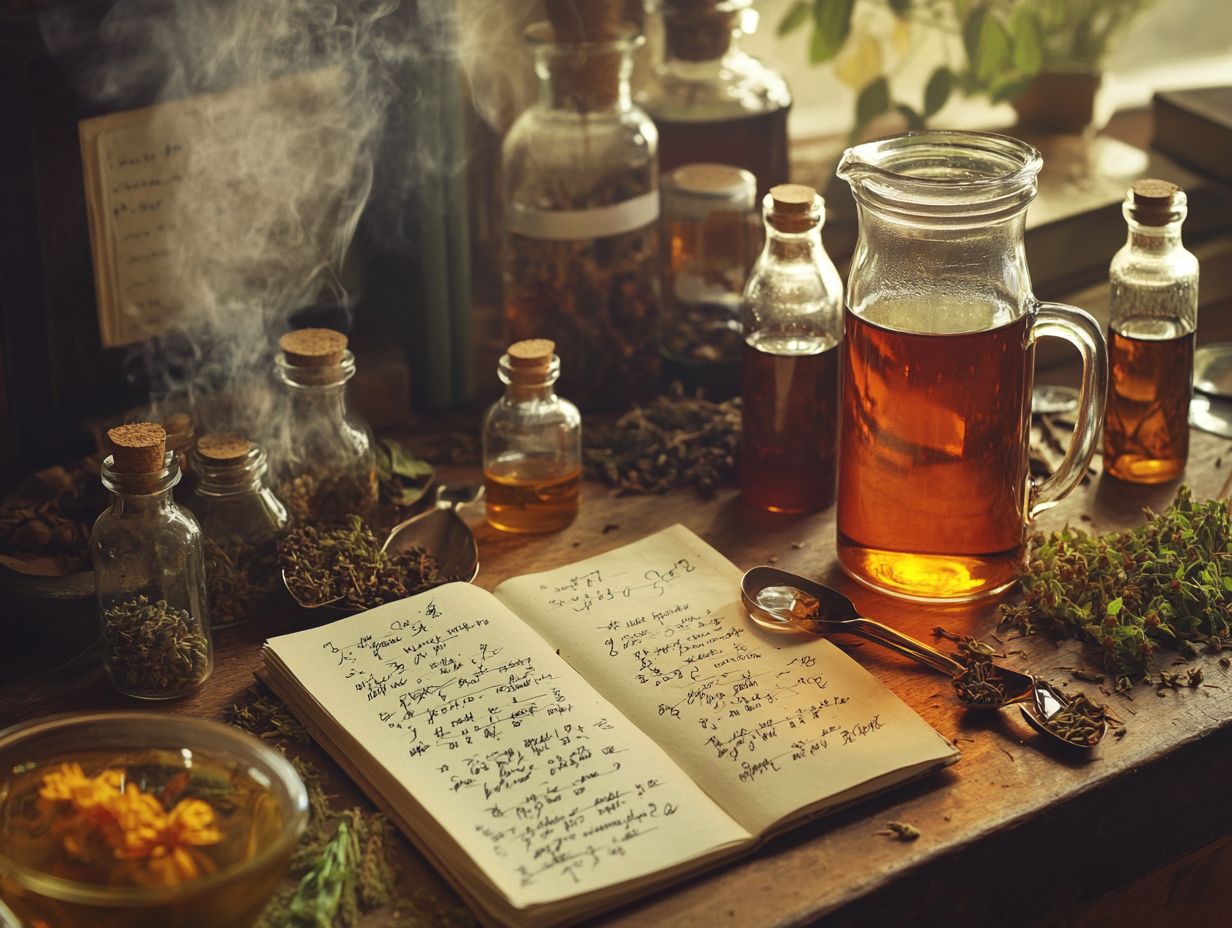
To ensure your safety while using herbal medicine, it’s essential to combine caution with thoughtful consultation with healthcare providers.
It s equally important to source your products from reputable manufacturers, ensuring you receive the highest quality and efficacy.
Tips for Avoiding Harmful Interactions
To avoid harmful interactions when using herbal supplements, you should follow essential tips such as consulting your healthcare provider and keeping an eye on your health.
This proactive approach allows you to address any potential risks, including monitoring for side effects, before they escalate. To ensure your safety, it’s important to understand herbal safety. Make it a point to have regular check-ins with your healthcare provider, discussing not only the supplements you’re taking but also any changes in your symptoms or overall health.
For instance, you might consider maintaining a health journal to track your experiences, noting how various supplements impact your well-being over time. Sharing this information can empower your healthcare provider to make informed adjustments to your treatment plan.
It’s important to educate yourself about possible interactions between herbal supplements and your prescribed medications. Utilizing resources like reputable online databases or support groups can help you stay well-informed, including herbal remedies safe dosage for adults and children.
Balancing Safety and Effectiveness
Balancing safety and effectiveness when using herbal products demands your careful attention to active ingredients, dosage, and your individual health needs. Active ingredients are the parts of the herb that have medicinal effects. This is particularly crucial, as what works wonders for one person might spell trouble for another.
It’s essential for you to evaluate your own health conditions, including any cardiovascular issues, and consult healthcare professionals when needed, ensuring you choose the herbal dosage guidelines for pregnant women that suit your unique circumstances.
For example, if you have hypertension, it’s wise to be cautious about certain herbal remedies that might raise your blood pressure. Keeping a journal to track your reactions to specific products can be invaluable; it allows you to gauge both effectiveness and side effects. For detailed information, refer to understanding herbal dosage, ultimately empowering you to make informed decisions about your health and wellness.
Frequently Asked Questions
What is herbal medicine?
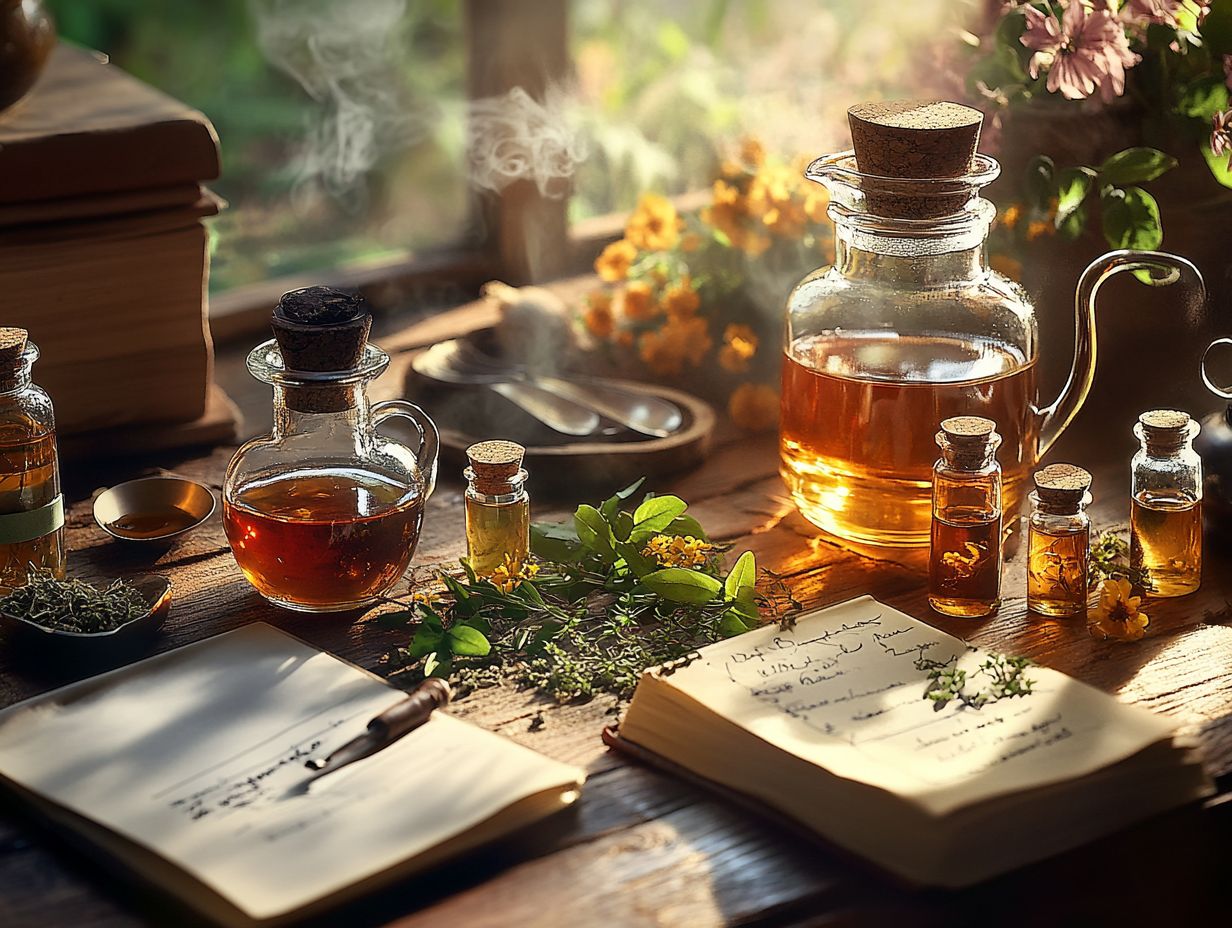
Herbal medicine refers to the use of medicinal plants or plant extracts for the treatment or prevention of various health conditions.
What is the appropriate dosage for herbal medicine?
The dosage for herbal medicine may vary depending on the type of herb and the specific health condition being treated. It is important to consult with a qualified herbalist or healthcare provider for proper dosage instructions.
Can herbal medicine interact with other medications?
Yes, herbal medicine can interact with other medications. It is important to inform your healthcare provider of all the medications and supplements you are taking to avoid potential interactions.
What are the possible interactions between herbal medicine and prescription drugs?
Herbal medicine can interact with prescription drugs in various ways, such as enhancing or reducing their effects or causing side effects. For example, St. John’s wort can reduce the effectiveness of certain antidepressants.
Are there any precautions to take when using herbal medicine?
Yes, there are precautions to take when using herbal medicine. It is important to research and consult with a qualified herbalist or healthcare provider before taking any herbal supplements, especially if you have a pre-existing medical condition or are pregnant or breastfeeding.
Can herbal medicine be used alongside conventional medicine?
Yes, herbal medicine can be used alongside conventional medicine. However, it is crucial to inform your healthcare provider of all the medications and supplements you are taking to avoid potential interactions and ensure the safest and most effective treatment plan for your health condition.
Ready to take charge of your health? Start your journey with herbal medicine wisely today!

